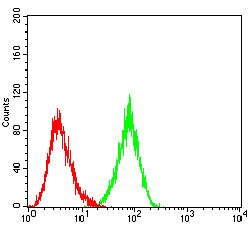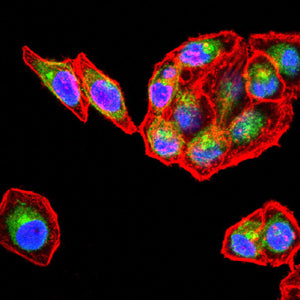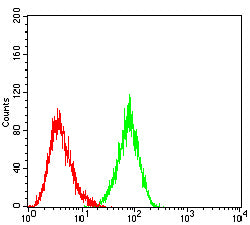


| WB | 咨询技术 | Human,Mouse,Rat |
| IF | 咨询技术 | Human,Mouse,Rat |
| IHC | 咨询技术 | Human,Mouse,Rat |
| ICC | 1/200 - 1/1000 | Human,Mouse,Rat |
| FCM | 1/200 - 1/400 | Human,Mouse,Rat |
| Elisa | 咨询技术 | Human,Mouse,Rat |
| Aliases | MMR; hMR; CD206; MRC1L1; CLEC13D; CLEC13DL; bA541I19.1 |
| Entrez GeneID | 4360 |
| clone | 1E12A7 |
| WB Predicted band size | 166 kDa |
| Host/Isotype | Mouse IgG1 |
| Antibody Type | Primary antibody |
| Storage | Store at 4°C short term. Aliquot and store at -20°C long term. Avoid freeze/thaw cycles. |
| Species Reactivity | Human |
| Immunogen | Purified recombinant fragment of human CD206 (AA: extra(19-218)) expressed in E. Coli. |
| Formulation | Purified antibody in PBS with 0.05% sodium azide |
+ +
以下是3-4条关于CD206抗体的参考文献摘要概括:
---
1. **文献名称**:*CD206⁺ M2 macrophages regulate pathological transition to chronic diseases*
**作者**:Martinez-Pomares L, Gordon S
**摘要**:探讨CD206作为M2型巨噬细胞标志物在慢性炎症和纤维化疾病中的作用,强调其在组织修复和免疫调控中的双重功能,并通过抗体标记技术验证其表达模式。
---
2. **文献名称**:*Targeting tumor-associated macrophages via anti-CD206 antibody enhances anti-PD-1 therapy in melanoma*
**作者**:Kzhyshkowska J, et al.
**摘要**:研究CD206抗体在黑色素瘤模型中的应用,发现阻断CD206⁺肿瘤相关巨噬细胞可增强PD-1抑制剂疗效,揭示其作为联合治疗靶点的潜力。
---
3. **文献名称**:*CD206 mediates the binding of high mannose glycans to macrophages in Leishmania infection*
**作者**:Murray PJ, et al.
**摘要**:利用CD206特异性抗体研究巨噬细胞甘露糖受体在利什曼原虫感染中的功能,证明病原体通过CD206逃逸免疫清除的机制。
---
4. **文献名称**:*CD206 as a biomarker for M2 macrophage polarization in pulmonary fibrosis*
**作者**:Wynn TA, et al.
**摘要**:通过免疫组化和流式细胞术分析CD206抗体标记的巨噬细胞,证实其在肺纤维化组织中显著富集,并与疾病进展相关。
---
以上文献聚焦CD206抗体在疾病模型、免疫治疗及机制研究中的应用,涵盖肿瘤、感染和纤维化等方向。
CD206. also known as the macrophage mannose receptor (MRC1), is a transmembrane glycoprotein primarily expressed on the surface of macrophages, particularly the alternatively activated M2 subset. It plays a critical role in innate immunity by recognizing pathogen-associated carbohydrate patterns (e.g., mannose, fucose) on microbes, facilitating their phagocytosis and antigen presentation. Additionally, CD206 is involved in tissue remodeling, immune tolerance, and resolution of inflammation, making it a key marker for distinguishing pro-inflammatory M1 macrophages from anti-inflammatory or repair-oriented M2 macrophages.
CD206 antibodies are essential tools for identifying and studying macrophage polarization in various pathological contexts, including cancer, fibrosis, and infectious diseases. In cancer research, CD206+ macrophages are often associated with tumor progression and immunosuppression within the tumor microenvironment. Structurally, CD206 contains multiple functional domains, such as cysteine-rich regions and carbohydrate recognition domains, which mediate ligand binding and endocytic functions.
These antibodies are widely used in techniques like flow cytometry, immunohistochemistry, and Western blot to assess macrophage phenotypes and their functional roles. Clinically, CD206 expression has been explored as a prognostic biomarker in diseases like melanoma and liver fibrosis, while its therapeutic targeting is being investigated to modulate immune responses. Overall, CD206 antibodies provide critical insights into macrophage biology and their dual roles in host defense and disease pathogenesis.
×